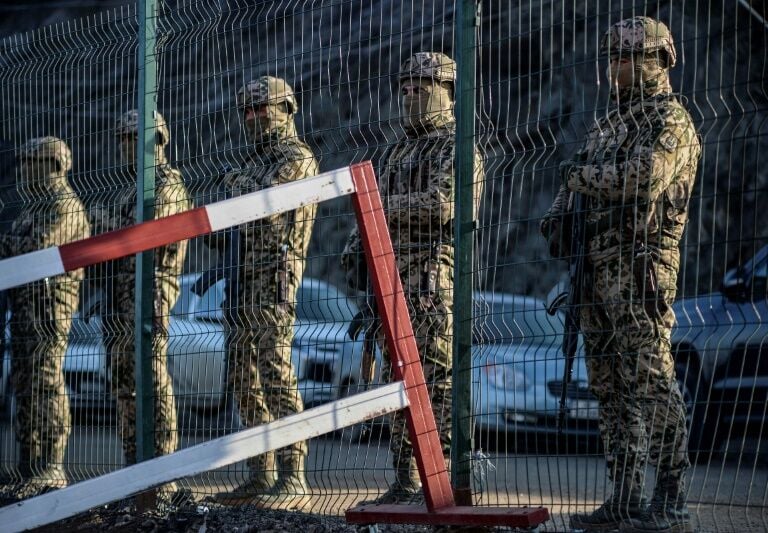Azerbaijan establishes border checkpoint on disputed land link, igniting tensions with Armenia

In a provocative move that has riled up its arch-enemy Yerevan, Azerbaijan established a border checkpoint yesterday on the only land link between Armenia and the disputed Nagorno-Karabakh enclave. Tensions continue to mount between the two ex-Soviet Caucasus nations with fierce rivalries centred around the Azerbaijani Armenian-majority territory of Nagorno-Karabakh.
Azerbaijan’s state border service announced…
“The units of the Azerbaijani Border Service established a border checkpoint on the sovereign territory of Azerbaijan, at the entrance of the Lachin-Khankendi Road.”
The two countries have engaged in two significantly destructive wars in both the 1990s and 2020 over the contested region.
The Russia-brokered ceasefire that halted the 2020 war stipulates that safe passage should be ensured by Azerbaijan along the Lachin corridor, with Russian peacekeepers patrolling the area. However, Azerbaijan ignored this requirement, setting up the checkpoint at 12pm (0800 GMT) yesterday, allegedly for the purpose of “preventing the illegal transportation of manpower, weapons, mines.” The decision to operate the checkpoint, according to Azerbaijan, will be taken in conjunction with the Russian peacekeeping force.
Washington reacted to this development with concern, stating that it is “deeply worried that Azerbaijan’s establishment of a checkpoint on the Lachin corridor undermines efforts to establish confidence in the peace process.” The State Department has called upon the two opposing sides to “resume peace talks and refrain from provocations and hostile actions along the border,” asserting that “free and open movement of people and commerce on the Lachin corridor” should be ensured.
The French foreign ministry also condemned the move, deploring the violation of ceasefire agreements and stating that it would hinder the ongoing negotiation process.
The Lachin corridor has become a focal point for rising tensions since last year with Russia’s attention primarily focused on the Ukraine offensive. In December, Azerbaijani activists besieged the Lachin corridor in protest against alleged illegal mining in the area. Yerevan has accused Baku of orchestrating the demonstrations and contributing to the worsening humanitarian crisis in the mountainous enclave.
In a blatant escalation, Azerbaijan justified the construction of the border checkpoint by citing “threats and provocations” originating from Armenia, which has denied these allegations. Baku has accused Yerevan of using the corridor for rotating military personnel, transferring weapons and ammunition, facilitating the entrance of terrorists, and engaging in the illicit trade of natural resources and cultural property. It has claimed to have documented military convoys entering Azerbaijani territory and noted the construction of military infrastructure being built at the site closest to Azerbaijani land.
The Armenian foreign ministry has rejected these claims, calling them a “far-fetched and baseless pretext.” It has vehemently voiced its opposition to the checkpoint, asserting that it represents “a gross violation” of the 2020 ceasefire agreement and embodies Baku’s “policy of ethnic cleansing in Nagorno-Karabakh.”
The separatist authorities of Nagorno-Karabakh have urgently called upon “the Russian Federation to immediately begin discussions,” covering multiple topics including “the prohibition of establishing” the border checkpoint.
Russia’s diminishing influence in the region has become quite apparent due to its preoccupation with the Ukraine offensive and ongoing confrontation with the West. Yerevan, which relies primarily on Russia for security, has expressed frustration with the Kremlin’s inability to fulfil its peacekeeping role effectively in the area.
Recent months have seen a spate of fatal clashes involving servicemen from both Armenia and Azerbaijan. On Sunday, Armenia reported that its forces had killed one Azerbaijani serviceman, with Azerbaijan stating that they were acting in self-defence in response to enemy fire.
Latest Thailand News
Follow The Thaiger on Google News:


























